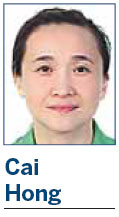Abe should know what the right words are
Updated: 2014-01-31 06:41
By Cai Hong (China Daily Europe)
|
|||||||||||
Japanese prime minister's platitudes about peace do not tally with his bellicose behavior
In his Lunar New Year greetings published by two Chinese-language newspapers in Japan on Jan 30, Japanese Prime Minister Shinzo Abe said individual issues should not be allowed to weigh in on bilateral relations.
"Should obstacles arise before us, let us overcome them and advance together towards the future."
This was the message Abe sent to Chinese people living in Japan before the Chinese Lunar New Year, which began on Jan 31. Both China and Japan are celebrating the Year of the Horse.
That was a gesture of goodwill by Abe but it was shortlived.
"We must restrain military expansion in Asia ... which otherwise could go unchecked," the same Abe, turning hostile, warned the global business and political delegates at the World Economic Forum at the Swiss resort of Davos on Jan 22. "If peace and stability were shaken in Asia, the knock-on effect for the entire world would be enormous."
His veiled remarks, clearly aimed at China, put the tensions between his country and China at the front and center at the confab, sounding an alarm over what he sees as China's rising militarism and Japan's outdated defense position.
He explicitly compared tensions between Japan and China to animosity between Britain and Germany in the run-up to the World War I.

Well, I see two faces of the Japanese prime minister. And I wonder which is the real Abe.
He knows perfectly well the issues standing in the way of China-Japan relations and has allowed them to ruin the ties.
Abe 1.0 couldn't wait to visit Beijing shortly after taking office in 2006. Thanks to his predecessor Junichiro Koizumi's annual visits to the controversial Yasukuni Shrine during his five-year tenure, state visits between the two countries came to a halt. In Abe's short Beijing visit - his first overseas destination - China and Japan issued a joint statement calling for efforts to build a "mutually beneficial relationship based on common strategic interests". The diplomatic ties thawed almost overnight.
Now Abe 2.0 is deliberately taking the relationship to the point of freezing cold. And he has used history as one of his cryogens.
He carefully timed his visit to Yasukuni Shrine on Dec 26, the first anniversary of his second premiership, and kept it secret until the last hour.
"I made a promise to the Japanese people, so I've decided to (visit Yasukuni)," Abe was quoted by Japanese newspaper Mainichi Shimbun as saying to Fukushiro Nukaga, head of a parliamentary league on Japan-South Korea relations, in a phone call on the morning of Dec 26.
Conservatives helped vote Abe into office the second time.
"I advise against going through this in the strongest possible terms," Nukaga was quoted by the newspaper as replying. His protest fell on deaf ears.
To reduce the expected impact on Japan's foreign relations, Abe's closest associates drew up a prime ministerial statement reaffirming Japan's commitment to everlasting peace.
Even in many Japanese people's eyes, Yasukuni is not the place where Japanese politicians should set foot, let alone make a no-war pledge.
It was set up originally to enshrine the Japanese who died in the Meiji Emperor's service and Japanese emperors paid homage there. But many soldiers killed in World War II were later enshrined at Yasukuni without the permission of their relatives. The fact that the shrine has had 14 Class A war criminals on its rolls since 1978, which was revealed in 1979, displeased Emperor Hirohito, who stopped visiting after 1975.
A group of citizens in Osaka may sue the Japanese government and Abe in March for mental distress caused by his Dec 26 Yasukuni visit, according to the Kyodo News agency. In filing the lawsuit for compensation at the Osaka District Court, the plaintiffs will claim that the visit violates the constitutional principle of separation of state and religion. The group plans to file a similar lawsuit with the Tokyo District Court.
Abe is the first serving Japanese prime minister to visit the shrine since Koizumi went there in 2006. During Koizumi's premiership, some 6,000 lawsuits were filed against his visits to the shrine for unconstitutionality and psychological trauma. In June 2006, Japan's Supreme Court rejected an appeal by plaintiffs asking for damages over Koizumi's Yasukuni visits.
Some Japanese politicians, Abe included, have deliberately obfuscated respect for Japan's war dead with Japanese politicians' visits to Yasukuni. By insisting on visiting, Abe wants to show that he doesn't make concessions to China and South Korea over visits to Yasukuni, and to pander to his constituents.
China will never pardon the 14 Japanese Class A war criminals even if it has forgiven ordinary Japanese soldiers; it is a cardinal issue of right and wrong.
Efraim Zuroff, the Israeli director of the Simon Wiesenthal Center, a Los Angeles-based, Jewish human rights organization, said: "The passage of time should not afford protection for Holocaust perpetrators."
Similarly, time will not, and should not, absolve Japan's war criminals of their evil.
The author is China Daily's Tokyo bureau chief. Contact the writer at caihong@chinadaily.com.cn
(China Daily European Weekly 01/31/2014 page13)
Today's Top News
Trade frictions with the EU likely to grow
Xi, Putin vow stronger ties
Pollution dampens fireworks sale
US warns airlines about 'toothpaste bombs'
Dutch security services bug phones
President Xi leaves for Sochi ceremony
Vatican's child abuse record slammed
Schroeder accuses US of disrespect
Hot Topics
Lunar probe , China growth forecasts, Emission rules get tougher, China seen through 'colored lens', International board,
Editor's Picks

|

|

|

|

|

|





